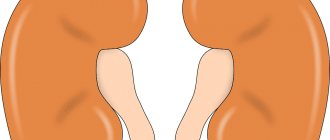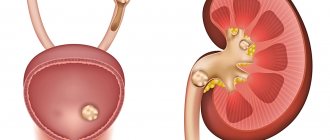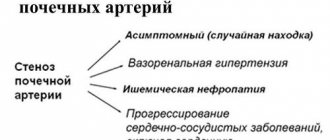Pregnancy is an exciting period in a woman’s life. The body undergoes dramatic changes, supplying the child with the nutrients it needs for development.
Due to a deficiency of certain substances and changes in hormones, chronic diseases worsen and new ones appear. One of the pathologies is renal colic in pregnant women.
Renal colic is quite common in pregnant women.
The main reason why a pregnant woman may experience lower back pain due to colic is a dysfunction of the ureters, due to which urine is not completely excreted.
The kidneys take a hit during pregnancy because the uterus is enlarged. Factors that provoke colic in the kidneys include:
- kidney stones;
- gynecological diseases;
- kidney injuries and tumors;
- polycystic disease;
- organ displacement.
Renal colic during pregnancy is felt from blockage of the urinary canal by a large stone. If a woman has kidney stones before conceiving a child, she needs to monitor her health and get tested so as not to miss the movement of stones.
general information
During pregnancy, a woman experiences a change in her normal hormonal levels, which is accompanied by metabolic disorders.
As a result, a large amount of mineral impurities are formed in the urine, which over time develop into stones.
Under the influence of the growing uterus, the area of the urinary canal is pinched, and urine cannot leave the body in full.
Under the influence of certain factors, the kidney stone begins to advance, causing severe pain to the patient. This condition is called renal colic.
If measures are not taken in time to eliminate the problem, then the stone may simply get stuck inside the ureter, this leads to impaired kidney function up to complete failure.
The main causes of renal colic
An attack of renal colic is not a disease, but a syndrome characterized by pain in the back and lower back. An attack occurs as a consequence of diseases of the urinary system or disturbances in the functioning of the kidneys. Pregnancy itself does not lead to the formation of urolithiasis, but due to the fact that the load on the kidneys increases during pregnancy, the likelihood of complications increases significantly.
The main diseases causing renal colic are:
- urolithiasis disease;
- acute or chronic pyelonephritis;
- glomerulonephritis;
- gynecological diseases;
- nephroptosis;
- polycystic kidney disease;
- hydronephrosis;
- kidney neoplasms;
- kidney injury;
- wandering kidney.
Causes of the problem
| Group of reasons | Nosologies |
| Acute mechanical obstructions to urine outflow | Obstruction by stones, blood and other clots Kinks of the ureter, leading to its compression Tumors of the pelvis, ureter, as well as the retroperitoneum and pelvic organs, compressing the urinary tract from the outside |
| Inflammatory, allergic diseases of the kidneys and urinary tract | Acute segmental swelling of the urinary tract mucosa with pyelonephritis or urethritis; Hyperemia and swelling of the mucous membrane of the lower third of the ureter with phlebostasis in the pelvis |
| Acute vascular diseases of the kidneys and urinary tract | Renal vein thrombosis Renal infarction |
| Urodynamic disorders of the upper urinary tract | Dependent on overstrain of nerve receptors both in the urinary tract, genitals, and beyond |
The most common cause is obstruction (blockage) of the ureter with too large a stone
The most common cause of renal colic is obstruction (blockage) of the ureter with too large a stone, which causes pain in the lumbar region.
Women who suffered from urolithiasis before pregnancy should be especially careful, as the risk of renal colic increases. This is due to hormonal changes during pregnancy, which causes the internal organs located in the abdominal cavity to expand and relax.
Stones in urolithiasis can be of different sizes and located anywhere in the urinary system. But renal colic is not only caused by stones. Blood clots, mucus, and neoplasms can also become an obstacle to the normal outflow of urine. Often, inflammatory diseases of the urinary system pose a threat: pyelonephritis, glomerulonephritis. It is important to understand here that the urinary system is directly related to the reproductive system, especially for women. A history of inflammation, uterine fibrosis, or fibroids can cause renal colic.
We should not forget about such a disease as a wandering kidney. Most often it affects women who fiercely want to lose weight. The problem is that the kidneys, due to their anatomical structure, are not secured in any way in the abdominal cavity; without going into medical terminology, they are held in place by fatty tissue. If a woman loses weight intensively and uncontrollably, the fatty tissue will decrease and the kidney will begin to move throughout the abdominal cavity.
Causes of occurrence in pregnant women
As described above, the main provoking factor is a dysfunction of urine excretion. Other factors include:
- gynecological problems;
- stones and sand in the kidneys;
- kidney injuries;
- the presence of neoplasms in the organ;
- displacement from the normal anatomical position;
- multiple cyst formation.
In most cases, it is kidney stones that cause colic. Due to the enlarged uterus, the organ may shift slightly, which disrupts the natural excretion of urine. Very often, renal colic is the result of an exacerbation of pyelonephritis.
It is important to note that if a woman was diagnosed with urolithiasis before pregnancy, the risk of developing colic increases several times.
Therefore, it is very important to carry out comprehensive treatment even before fertilization.
The provoking factor is the relaxation of muscle muscles due to changes in hormonal levels.
Differential diagnosis
First of all, renal colic during pregnancy must be differentiated from such pathological conditions and diseases as:
- Inflammation of the appendicular process;
- paroxysmal pain in the right hypochondrium, the area of the gallbladder due to liver problems;
- first attack of acute, exacerbation of chronic cholecystitis;
- all types of pancreatitis;
- complicated, not accompanied by complications of ulcers along the gastrointestinal tract;
- all types of mechanical, dynamic intestinal obstruction;
- dissecting aneurysmal dilatation;
- thromboembolism of mesenteric arteries;
- inflammation of the pelvic organs;
- tubal or ovarian pregnancy;
- various types of torsion of ovarian cysts;
- hernial protrusions against the background of degenerative-dystrophic lesions of the spinal column;
- hypothermia in a draft, viral damage to the intercostal nerves;
- herpes, lichen.
When lower back pain occurs in a pregnant woman, it is necessary to call an ambulance or immediately consult a doctor yourself. The following diagnostic methods are prescribed:
- A general urine test, in which the presence or absence of hematuria, i.e. red blood cells, should be assessed. White blood cells in a urine test indicate inflammation. If you pass urine through filter paper, you may find sand or small stones.
- Clinical analysis does not have a specific picture of renal colic during pregnancy. It is necessary for differential diagnosis with an acute process.
- Biochemical analysis in such cases should be performed to differentiate renal colic during pregnancy from other clinically similar diseases.
- Ultrasound examination allows you to see stones in the calyces, pelvis, ureters, and bladder.
Complaints of pain in the projection of the kidneys should be taken especially seriously, and attention should be paid to whether there are dysuric disorders if the pregnant woman has one kidney.
Considering that X-ray examinations of pregnant women are performed only for health reasons, it is advisable to refuse excretory urography, general examination, and computed tomography.
Symptoms and signs
In the initial stages, a pregnant woman feels severe pain in the lumbar region, this is renal colic. The attacks are sudden and do not last long at first. As it progresses, other unpleasant symptoms may appear.
Stages of flow
As the stone progresses, the woman experiences severe pain that resembles contractions, so they are confused with childbirth. Other signs are:
- increased body temperature;
- pain from the lower back spreads throughout the body and lasts for a long time, the woman cannot find a comfortable position;
- severe chills;
- the patient feels nauseous and may vomit;
- the urge to go to the toilet becomes frequent, while the amount of urine excreted is very small;
- If the walls of the ureter are damaged, blood may be present in the urine.
If the disease is not treated on time, then an inflammatory process joins the colic and the woman is eventually diagnosed with pyelonephritis.
This is a very dangerous condition that poses a threat not only to the health of the mother, but also to her unborn child. Sometimes pain during renal colic is mistaken for the onset of labor and the woman in labor may be hospitalized.
Indications for surgical treatment
Stones less than 5 mm in 85-95% of cases pass on their own; if their size is 10 mm or more, surgical intervention is required. The indication for surgical treatment for urolithiasis is urinary tract obstruction that persists for several days. In addition, the reason for surgery may be incessant severe pain that is not relieved by antispasmodics, analgesics and drugs.
In more severe cases of the disease, stones are removed surgically immediately after a cesarean section in late pregnancy.
First aid
If renal colic occurs, you should immediately call an ambulance. It is very important to properly relieve the first symptoms.
To dull the signs of pain, it is recommended to take a tablet of No-shpa, Papaverine or Nitroglycerin.
A prerequisite is to control the amount of urine excreted; it is best to collect it in a special container (this is done for further laboratory analysis).
Contraindications
Pregnant women should never use heating pads or take hot baths during an attack, as this will lead to serious complications.
It is prohibited to take medications that are contraindicated during pregnancy. You should not resort to traditional methods and self-medicate, as this can cause premature birth.
Nutrition
Diet plays a decisive role in reducing the risk of a recurrence of an attack. Thanks to dietary nutrition, the patient’s condition is alleviated and the return of the clinical picture is excluded. It is recommended to take food in small portions 5–6 times a day, drink liquids 2–3 liters per day.
Do not use:
- strong tea and coffee,
- pickles and smoked meats,
- legumes, etc.
The diet should include vegetables, fruits and berries, and dairy products. When renal colic occurs due to salt compactions, nutrition is selected based on the mineral composition of the stones. A proper diet, combined with a doctor’s prescription, will help dissolve urate formations.
With urates
If the doctor has concluded that the patient has urate stones, then the menu includes the following products:
- egg,
- fermented milk products,
- cheese,
- pasta,
- nuts,
- fruits,
- cereals,
- watermelons,
- seeds.
It is advisable to limit intake:
- legumes and sorrel,
- spinach and onions,
- bakery products,
- oatmeal,
- fish products,
- salt,
- chocolate.
It is strictly forbidden to use:
- fat meat,
- rich meat and fish broths,
- alcohol.
Oxalates
Oxalate stones are different from other stones in that they are difficult to dissolve. Therapy continues for a long period of time. It is recommended to follow a certain diet.
For oxalate compactions, you should use:
- stale bread and pastries,
- cereals and pasta,
- baked fish and meat,
- boiled potatoes,
- cottage cheese and yogurt,
- cabbage,
- watermelons and apples.
Drinking at least 2 liters of fluid per day will help eliminate salt formations up to 5 mm and sand in the urine. Such volumes of fluid are unacceptable in case of hypertension, renal pathology and predisposition to swelling.
Products that contain oxalic acid (tomatoes, sweet bell peppers, onions), vitamin C (citrus fruits and berries with a sour taste) are completely excluded. This list includes smoked and canned foods, foods high in cholesterol, tea and coffee, fatty broths, jellied meat, etc.
When consuming compotes, it is more advisable to give preference to drinks made from zucchini and pumpkin. Addiction to beet and tomato juice will lead to negative consequences. Mineral water of the following brands will benefit your health: Narzan, Essentuki, Obukhovskaya and others.
Diagnostic measures
First of all, the patient needs to contact her local gynecologist, who will give a referral to a consultation with a nephrologist or urologist.
Diagnostic methods include external examination, blood and urine tests (general and biochemical indicators), ultrasound examination of the kidneys and organs of the urinary system.
It is very important to identify the true cause that caused this condition. Only in this case can you choose an effective treatment regimen.
The danger of colic for pregnant women
Renal colic can harm the health of mother and child. They usually indicate the presence of pathologies of the urinary tract and can cause not only severe pain, but also intoxication. Therefore, at the first symptoms, you should consult a doctor and not self-medicate.
Spasms and pain provoke an increase in uterine tone, which can lead to premature birth or miscarriage. Timely assistance will prevent the development of serious complications. If a pregnant woman does not consult a doctor, the labor process can begin at any time. Sometimes colic causes pyelonephritis and kidney failure, progression of urolithiasis. Other complications are possible:
- development of anemia;
- chronic renal failure;
- fetal hypoxia;
- sepsis.
Therapy methods
After receiving the results of a comprehensive examination, the pregnant woman is prescribed a treatment regimen for renal colic. Often, medication is sufficient, but in some cases surgery is performed.
Drug treatment
A mandatory condition is to keep the patient in a hospital setting.
If the cause of renal colic is urolithiasis, then drugs are used that dissolve the resulting mineral deposits and promote their painless removal.
These drugs include Canephron, Cyston, Urolesan, etc. The doctor selects the dosage and course of treatment individually.
To relieve pain, No-shpa injections are used, which are safe during pregnancy. If an inflammatory process is associated with renal colic, a course of antibiotics is prescribed.
They are selected very carefully so as not to harm the normal development of the fetus.
As a rule, the dosage and duration of treatment are gentle, but long-term. Another condition for this diagnosis is the use of uranoseptics, which help remove accumulated urine.
In severe cases, a catheter is prescribed to remove urine, after which surgery is prescribed. The patient has accumulated stones removed and the ureter is cleaned. Today this is performed using laparoscopic surgery, which causes minimal harm to the health of the woman and her unborn child.
If renal colic appears after 34 weeks, the patient undergoes a planned cesarean section with parallel removal of mineral deposits. In the postoperative period, antispasmodics and anti-inflammatory drugs (No-Shpa, Ibuprofen, etc.) are prescribed.
ethnoscience
During pregnancy, it is not recommended to get carried away with traditional methods of treatment, as this can cause serious complications. Among the safest and most effective methods are:
- Decoction of lingonberry leaves. To do this, you will need 2 tablespoons of dry leaves, which are poured with 250 ml of water, brought to a boil and boiled for 30 minutes. Let it sit for a while, filter and consume 50 ml once a day. This decoction helps dissolve the stones.
- Rosehip infusion. Take 250 ml of boiling water for 1 tablespoon and leave everything in a thermos for several hours. Drink 0.5 glasses three times a day.
- A decoction of birch leaves and buds. You need to take 2 tablespoons of crushed raw materials, pour a glass of boiling water, cook for 10-15 minutes. Let cool, strain, consume 100 ml 2 times a day before meals. This decoction helps remove accumulated urine.
It is very important to first consult with your doctor before starting treatment.
Nutrition rules
Proper nutrition of a woman during pregnancy plays an important role. To eliminate the risk of developing renal colic, it is necessary to exclude all fried, salty, spicy and smoked foods.
Minimize the use of table salt. You need to eat in small portions, but often (up to 5 times a day).
It is better to drink purified water or herbal teas. The amount of liquid should be moderate so as not to provoke the development of edema. A specialist will help you choose the right diet.
Safe treatment of the disease
Before starting therapy, it is necessary to accurately diagnose and determine the causes of the pathology. To treat renal colic in pregnant women, approved drugs are used, which are presented in the table:
| Drug group | Examples |
| Analgesics | "Tramal", "Analgin" |
| Antispasmodics | "Papaverine", "Baralgin" |
| Antihistamines | "Diphenhydramine" |
| Decongestants | "Cyston", "Canephron" |
To treat renal colic in a pregnant woman, the doctor prescribes pills, or less often, surgery.
The use of pharmaceuticals is recommended when the size of stones found in the kidneys is less than 10 mm. If the stones are large, then surgical intervention will be required, which is permissible only if there are compelling reasons and if conservative methods of therapy are ineffective. Treatment, as well as any medications, their dosage, release form and dosage regimen for women expecting the birth of a baby, is prescribed by the doctor.










